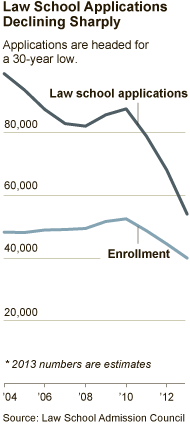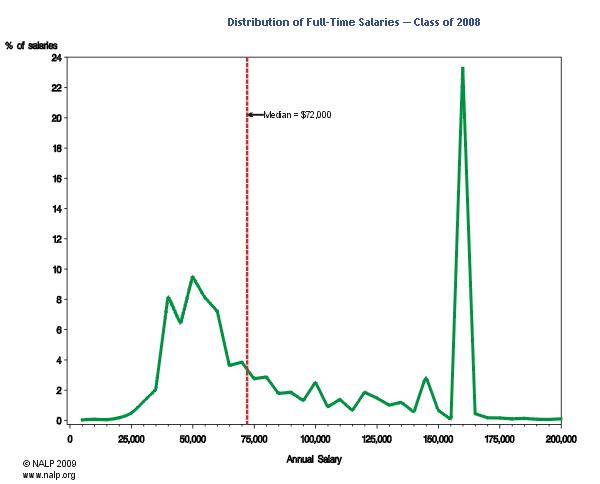PARDON OUR HYPERBOLE: There’s been a boom in “law school is bad” articles in the last few months, and today’s piece in the NYT is only the latest. All of this is old news to readers of Inside the Law School Scam blog, written by an actual law professor, but it’s good to see that this view has finally become conventional wisdom. If you’re thinking about law school, or know anybody who is, please have them take a look at this:
After going up for seemingly forever, law school applications and enrollment are down dramatically. Why are they down? Because law school takes three years of your life plus as much as two hundred grand plus three years of missed earnings–and way too many graduates can’t get a job, at least not a law job.
Take a look at this graph, courtesy of Above The Law:
This is what’s known as a bimodal distribution. What’s going on is that a number of students from the top schools get paid $160K, while most of the rest make around $50K. That’s not a bad salary… unless you just spent seven years of your life and God only knows how much money to get that $50K job.
Oh, and by the way: even the highly-paid jobs are disappearing.
Of course, law school’s not the only questionable use of money in education. There seems to be something similar, though less drastic, going on with business schools:
MBAs just cannot get the job offers that their peers got several years before. An even more painful fact is that most employers now only hire a few MBAs and only recruit from a select few schools. So, those students going to second-tier MBA programs are finding fewer job opportunities at top firms.
Ten years ago, I used to tell candidates that an MBA was a great investment, regardless of which program they went into, as long as they had a general idea of where they wanted to take their career. Today, I cannot state that belief anymore. In fact, I tell candidates that if they want an MBA, then go to one of the top five schools: Wharton, Harvard, Stanford, MIT, and Kellogg. If they cannot get into one of these schools, then don’t even go to another school. The return on investment is just not there.
The internet is known for its winner-take-all economies, but education seems to be moving in that direction as well.
It’s not just the professional schools we’re wasting money on: does your kid really need pre-school? If you’re smart enough to be reading my blog, then there’s a good chance the answer is no:
Research suggests that preschool only benefits children from these disadvantaged families (in particular, families that are below the poverty line, whose mothers are uneducated, or who are racial minorities). This could be because preschool acts as a kind of “equalizer,” ensuring that for at least a few hours a day, these kids get the same high-quality interaction with adults as more advantaged children do, which helps to even the developmental playing field.
Commenting on this article, Razib Khan writes over at Discover:
1) A substantial proportion of the variation in I.Q. and personality is heritable in a genetic sense. Many observations of parent-child similarities presumed that they were due to learning and emulation, but statistical analysis suggests this is not the case. Today, with genomic understanding of sibling relatedness (recall that though siblings should be related 0.50, there is some variation about this value) this seems more true than ever; much of the difference between siblings seems to be due to the variation of their genetic make up.
2) Most of the “environmental” variation is not accounted for. It could be non-shared socialization. Peer groups as Judith Rich Harris of The Nurture Assumption would argue. It could be gene-gene interactions, which for technical reasons are captured as “environmental” variance. Or developmental stochasticity in utero. Sending your children to Waldorf or Montessori is unlikely to do the trick.
In other words, the best way to have smart kids is by having a smart spouse. Which is not what some people want to hear, but it’s the truth, like it or not. When it’s your money at stake–and there is a lot of money at stake with education these days–you want to make decisions based on facts, not emotions or unsupported opinions.


Recent Comments